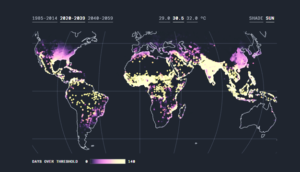The Emergency Medicine Day campaign for 2024 will be dedicated to the impact of climate change on Emergency Medicine.
The compelling testimonies from colleagues and patients have made clear to us that we must take action and ensure this issue is brought to everyone’s attention.
Climate change is humanity’s biggest health threat currently, according to the World Health Organization (WHO). “Climate change is impacting people’s health in a myriad of ways, including: Leading to death and illness from increasingly frequent extreme weather events, such as heatwaves, storms and floods, disruption of food systems, an increase in zoonoses and food-, water- and vector-borne diseases, and mental health issues.

This model provides a forecast of extreme heat days for the next 15 years (developed by Carbon Plan in collaboration with the Washington Post).
In addition, climate change is compromising various crucial aspects that directly impact our well-being, including livelihoods, equal opportunities, accessibility to quality healthcare and social support systems. These climate-sensitive health risks are disproportionately felt by the most vulnerable and disadvantaged, including women, children, poor communities, migrants or displaced persons, older populations, and those with underlying health conditions.”
Click here to access the WHO factscheet
There is enough data to anticipate that extreme heat is leading to a global increase in mortality rate, and it will continue to exert immense pressure on our healthcare systems, particularly on emergency care services. We are witnessing a progressive increase in heatstroke, heart and kidney damage, new and unexpected infectious diseases like zoonosis, water borne diseases, vector borne diseases, smoke-related pulmonary diseases secondary to wildfires, malnutrition-related disease due to droughts, injuries caused by floods and hurricanes. Not less important are the implications for mental health.
All these factors will place a growing burden on EM systems worldwide, and present them with new and daunting challenges.
As healthcare professionals, we have a vital responsibility to alleviate suffering and reduce the adverse effects of climate change on people’s health.
Therefore, the EM day campaign for 2024 will focus on these main goals:
- Advocate the imperative need to actively assess both the magnitude of the issue and the level of EM systems preparedness to face it.
- Raise awareness globally and promote actions to minimize the impact. For example, urging policymakers to take necessary measures to address the problem and bringing the issue to the attention of the general world population.
We will seek answers to the following questions:
- How prepared are EMS to deal with the problems arising from climate change?
- How can we better prepare?
- How can we increase understanding of these problems among healthcare professionals and the public?
Go to our Call to Action
